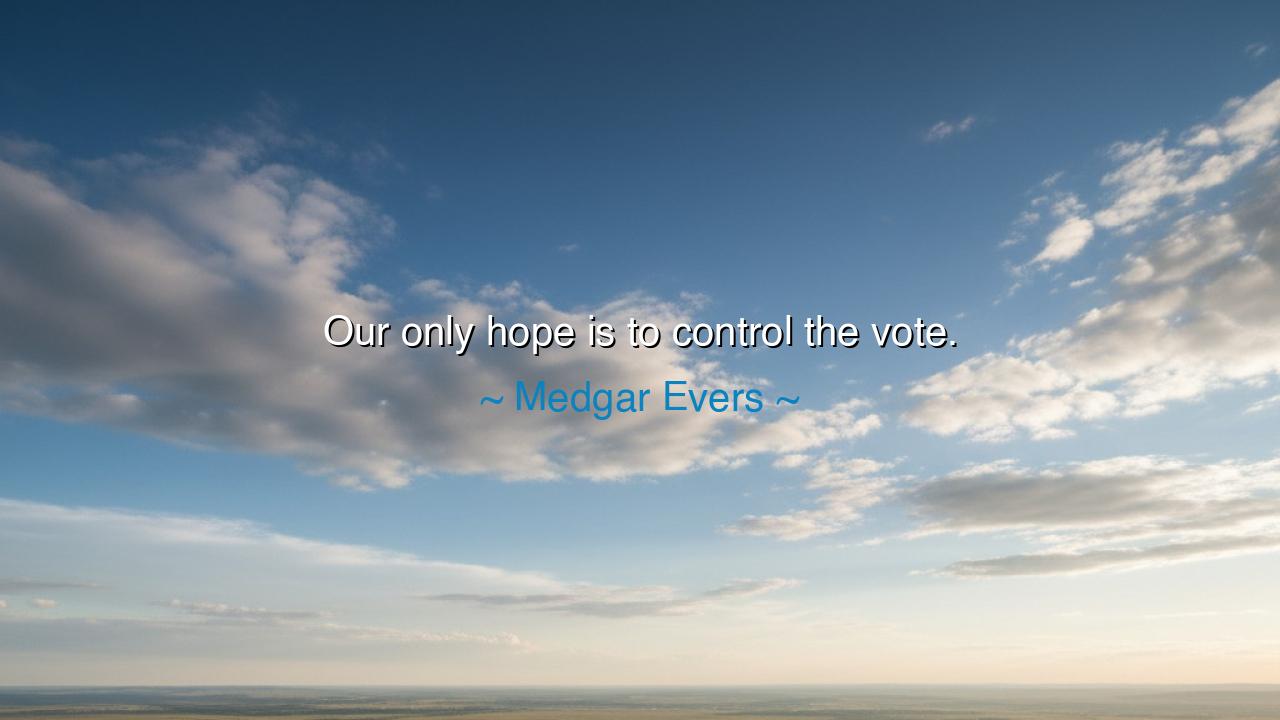
Our only hope is to control the vote.






The words of Medgar Evers, “Our only hope is to control the vote,” ring out like a battle cry from the depths of history, as fierce and prophetic now as when they were first spoken. They come from a man who stood at the crossroads of oppression and courage, a man who gave his life so that others might stand free. In this brief but powerful statement, Evers, the civil rights leader of Mississippi, declared the eternal truth of democracy: that the vote is not merely a privilege, but the very foundation of freedom. To control the vote, he said, is to claim agency over one’s destiny—to grasp the reins of justice, to transform suffering into power, and to awaken a people to their rightful place in the course of history.
Medgar Evers was born in 1925 in Decatur, Mississippi, into a world that denied his humanity because of the color of his skin. After serving honorably in World War II, he returned home to a land still poisoned by segregation, where the rights he had fought to defend abroad were denied to him and his people at home. Undeterred, he became a field secretary for the NAACP, organizing boycotts, investigations, and voter registration drives throughout the Deep South. To speak of “controlling the vote” in those days was to invite death. Yet Evers knew that without the power of the ballot, all other freedoms were illusions. To control the vote was not to dominate others—it was to reclaim equality, to demand dignity, and to secure the promise of America for those it had long betrayed.
When Evers said, “Our only hope is to control the vote,” he spoke in the shadow of violence. Across the South, African Americans who tried to register were met with intimidation, economic ruin, and bloodshed. Poll taxes, literacy tests, and terror were the weapons of a system built to keep the oppressed silent. But Evers understood that no chain of injustice could withstand the weight of organized, determined participation. For voting, to him, was more than a political act—it was a sacred duty, the voice of the voiceless, the peaceful weapon that could dismantle centuries of tyranny. He believed that through unity, education, and courage, even those long denied power could rise and govern their own fate.
History vindicated his vision. His work, though cut short by his assassination in 1963, ignited a fire that would not be extinguished. Two years after his death, the Voting Rights Act of 1965 was signed into law, striking down many of the barriers that had silenced millions. But Evers’ sacrifice also stands as a reminder that such victories are never permanent; they must be guarded and renewed in every generation. For as he knew, power does not surrender easily. The right to vote—the instrument of change—remains the most contested of freedoms, always under threat from those who fear equality more than justice.
To control the vote, as Evers meant it, is not merely to cast a ballot. It is to understand the moral weight of participation—to stand vigilant, to educate, to organize, to hold accountable those who rule in our name. It is to recognize that democracy is not self-sustaining, that it lives or dies by the will of those who cherish it. The tyrant thrives on apathy; the oppressor reigns when the righteous grow weary. But the people who know their power—who rise, register, and refuse to be silenced—are invincible. Their voice, united, becomes a tide that no force on earth can hold back.
The spirit of Medgar Evers lives on in every citizen who dares to believe that their single act of voting matters. It is felt in every community that stands in long lines to make its voice heard, in every young person who studies history and vows not to repeat its mistakes, in every elder who casts a ballot with trembling hands, remembering the days when such an act required courage beyond measure. His words remind us that hope is not a wish—it is a will, a discipline, a daily act of faith in the power of the people.
The lesson, therefore, is clear: freedom must be defended through participation. To honor the legacy of Medgar Evers is to guard the right to vote as one guards the flame of life itself. Do not surrender it to apathy. Do not let it be stolen by deceit. Stand for justice as he stood—unafraid, steadfast, and resolved that equality is not given, but claimed. For our ancestors bled for this right, and our children depend upon our vigilance to keep it alive.
So remember his words: “Our only hope is to control the vote.” Let them echo in your heart as both warning and promise. For the ballot, like freedom itself, is sacred—a covenant between the living and the dead, between the dreamers of the past and the builders of the future. Guard it. Use it. Honor it. For in the hand that casts a vote lies the power not only to shape a nation, but to fulfill the very dream for which Medgar Evers gave his life: a world where justice, equality, and freedom are not ideals—but realities.






AAdministratorAdministrator
Welcome, honored guests. Please leave a comment, we will respond soon